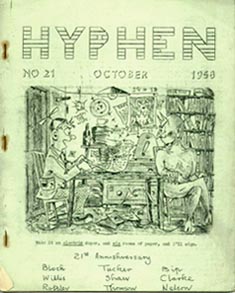Hyphen

Hyphen was a science fiction fanzine by Walt Willis with Chuck Harris from 1952 till 1958; A. Vincent Clarke for one issue in 1954; Ian McAuley from 1960 till 1962; and Madelaine Willis, from 1963 till 1987.
The first issue of Hyphen was published May 1952. It was first intended to fill the gap between issues of Slant, which was being published by Willis and James White. However, over time it became the main title that Willis would publish. 37 issues were released in all.
The title was meant to represent the effort to make this fanzine a joint UK - U.S.A. project, with fanwriters and artists from both sides of the Atlantic contributing.
Contributors to the Chuck Harris era Hyphen include Ken Beale, Ken Bulmer, Bert Campbell, George Charters, A. Vincent Clarke (Science Fantasy News), Ermengarde Fiske with the column "New York Letter", W. Max Keasler, Peter Ridley, Bob Shaw with the column "The Glass Bushel", William F. Temple (Novae Terrae), Bob Tucker (Le Zombie), and James White.
Illustrators included Bob Shaw, and James White.
Contributors to the Ian McAuley era include John Berry, Robert Bloch, A. Vincent Clarke, Ron Ellik, Bob Shaw, Bob Tucker, and Jeff Wanshel.
Illustrators include Ray Nelson, William Rotsler, Bob Shaw and ATom (The ATom Anthology).
Contributors to the Madelaine Harris era included George Locke (Smoke), Tom Perry, and Bob Shaw.
Illustrators included Stu Shiffman, Arthur Thomson (ATom), and Dave Wood.
The 1987 Revival Issue featured John Berry (The Damned Patrol), Chuck Harris, Patrick and Teresa Nielsen Hayden (Izzard), Eric Mayer, Bob Shaw, Arthur Thomson (ATom), James White and reprints of letters by William F. Temple.
Illustrators included Arthur Thomson (ATom).
During the 1950s, Hyphen was undeniably one of the most popular fanzines printed, topping reader polls every year. Later fanzine editors such as Greg Pickersgill cited it as a major influence.